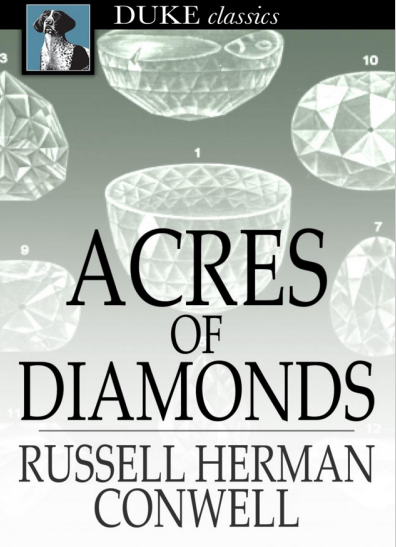

Russell Conwell’s Acres of Diamonds is a multifaceted work. It contains both a biographical appreciation of Conwell and the text of his famous lecture. The lecture itself centers on the idea that opportunities for success and wealth exist within one’s own community. Conwell uses stories and examples to illustrate his belief that individuals should recognize and capitalize on the potential around them. His biographical sketch details his life as a preacher, orator, educator, and founder of Temple University, highlighting his dedication to helping others. The work emphasizes the importance of hard work, honesty, and recognizing opportunities in one’s own environment, and also the importance of helping others along the way. Ultimately, Acres of Diamonds aims to inspire readers to find their own “acres of diamonds” and contribute to their communities.
Here is an 8-question FAQ based on the provided source material:
1. What is the main idea behind “Acres of Diamonds”?
The core message of “Acres of Diamonds” is that individuals often overlook the opportunities for wealth, success, and fulfillment that are present in their own communities and current circumstances. Instead of searching far and wide for riches, people should cultivate their local environment, utilize their existing skills and resources, and identify unmet needs within their reach.
2. What are some examples used in the lecture to illustrate this point?
The lecture includes several stories to reinforce the “Acres of Diamonds” concept. These include:
- Ali Hafed: A Persian man who sells his farm to search for diamonds, only to find out later that his farm was located on the Golconda diamond mine.
- The California Rancher: A man who sells his ranch to search for gold elsewhere, while the ranch he sold later became the site of a major gold discovery.
- The Pennsylvania Farmer: A man who sells his farm for a small sum and goes to work in the oil business, unaware that his farm contained a vast reservoir of oil.
- The Massachusetts Professor: A mining engineer who sells his family homestead that contains a large block of silver.
- The Hingham Toy Maker: A poor man who starts creating wooden toys, inspired by his children’s desires, leading to a very successful manufacturing business.
3. Why does Conwell advocate for people to get rich?
Conwell believes that acquiring wealth honestly is a virtuous pursuit, arguing that “to make money honestly is to preach the gospel.” He sees money as a tool that can be used for positive purposes: to fund religious institutions, support missionary work, and improve communities. He contends that those with wealth have a greater capacity to contribute to society’s betterment and that it is a Christian duty to attain riches honestly.
4. How does Conwell address the criticism that “money is the root of all evil”?
Conwell refutes this idea by clarifying the biblical quote. The Bible actually says “the love of money is the root of all evil.” He emphasizes that it is the love of money, or the obsessive pursuit and idolization of wealth, that is harmful, not money itself.
5. What is Conwell’s view on the importance of capital in starting a business?
Conwell downplays the necessity of large amounts of initial capital, asserting that knowing what people need is more valuable than a fortune. He contends that many successful individuals began with very little money and that an overreliance on inherited wealth can be detrimental to a person’s character and drive. He believes that the best things in life come from earning your own way.
6. What examples does Conwell give of how success is achieved through meeting the needs of other people?
Conwell offers the examples of A.T. Stewart and John Jacob Astor. Stewart achieved wealth by first identifying what customers needed. Astor succeeded in the millinery business not by mass-producing hats, but by observing what styles women preferred and then creating those specific bonnets.
7. Beyond wealth, what does Conwell value as important elements of a successful and fulfilling life?
Conwell emphasizes the importance of integrity, hard work, and contributing to the well-being of others. He believes that a good name, education, character, and a network of friends are more valuable than inherited money. He stresses the importance of living in a way that benefits others.
8. What is the significance of Conwell’s work in founding Temple University?
Conwell founded Temple University to provide educational opportunities to those who were unable to access them through traditional channels. He wanted to create an institution where working-class individuals could receive an education and improve their lives. The university’s establishment reflects Conwell’s commitment to helping others achieve their potential and find their own “acres of diamonds.” He dedicated the income from his “Acres of Diamonds” lecture to helping students afford their education.
Acres of Diamonds: A Comprehensive Study Guide
Quiz: Short Answer Questions
- What is the core idea that Conwell tries to impress upon his audience in “Acres of Diamonds?”
- Describe the story of Ali Hafed and its significance in relation to the lecture’s theme.
- Explain how Conwell justifies the pursuit of wealth and its relationship to Christian values.
- According to Conwell, what is the greatest moment a human heart may ever know?
- What are some examples Conwell used to show how people missed opportunities?
- What is Conwell’s opinion of inheriting wealth?
- Why does Shackleton compare Conwell to the Old Testament prophets? In what way does the comparison fail?
- What does Shackleton state was Conwell’s basic principle as a lawyer?
- What is Conwell’s typical Sunday schedule, according to Shackleton?
- What is Russell Conwell’s safety-pin story about?
Quiz: Answer Key
- Conwell emphasizes that opportunities for success and wealth exist in one’s immediate surroundings, utilizing one’s current skills, energy, and relationships, rather than seeking them elsewhere.
- Ali Hafed sells his farm to search for diamonds, only to discover later that his farm contained a diamond mine. It teaches the lesson that valuable opportunities often lie hidden in one’s own backyard, overlooked in the pursuit of distant riches.
- Conwell argues that honestly acquiring wealth is a form of “preaching the gospel,” because money can be used to do good, support religious institutions, and empower individuals to contribute positively to their communities.
- According to Conwell, the grandest moment a human heart may ever know is when a young man has earned his own home and invites his bride over the threshold, sharing the fruits of his labor and declaring, “I have earned this home myself. It is all mine, and I divide with thee.”
- Conwell cites examples like the Pennsylvania farmer who sold his oil-rich land for a pittance and the Massachusetts professor who sat on a silver deposit without realizing its value, illustrating how people often overlook readily available opportunities.
- Conwell believes that inheriting wealth can be detrimental, potentially cursing the inheritor by depriving them of the drive, character development, and personal satisfaction derived from earning one’s own way in life.
- Shackleton compares Conwell to the Old Testament prophets due to his power, ruggedness, and mental strength, noting similarities to those figures. However, the comparison fails because none of the prophets seems to have had a sense of humor.
- Shackleton states that as a lawyer, Conwell’s basic principle was that he would not take a case, civil or criminal, that he considered wrong. He would only fight on what he thought was the right side.
- According to Shackleton, Conwell’s typical Sunday schedule includes rising early to study, leading a men’s meeting, preaching at the main church service, addressing a large class of men in the afternoon, and preaching again at the evening service, with personal talks with congregants afterward.
- The safety-pin story is about a poor, injured worker who invented a rubber-tipped pencil and became a millionaire.
Essay Format Questions
- Analyze the rhetorical strategies Conwell employs in “Acres of Diamonds” to persuade his audience that wealth is attainable and morally justifiable. Consider the use of anecdotes, appeals to religious values, and engagement with potential counterarguments.
- Explore the concept of “acres of diamonds” in the context of contemporary society. To what extent does Conwell’s message resonate today, and what are some potential limitations or criticisms of his philosophy in the 21st century?
- Compare and contrast Conwell’s views on wealth and poverty with those of other prominent figures from the late 19th and early 20th centuries. How do his ideas align with or diverge from prevailing social and economic philosophies of the time?
- Discuss the role of personal responsibility and self-reliance in Conwell’s philosophy. How does he balance individual agency with broader social and economic factors that may influence one’s ability to achieve success?
- Examine the character and legacy of Russell Conwell based on both his own lecture and Shackleton’s biography. How do these sources contribute to our understanding of his impact as an orator, educator, and social reformer?
Glossary of Key Terms
- Acres of Diamonds: A metaphor for the idea that opportunities for wealth and success are often found in one’s own backyard, unrecognized or undervalued.
- Ali Hafed: The ancient Persian farmer in Conwell’s opening anecdote who sells his farm in search of diamonds, only to have diamonds discovered on the farm he sold. This story symbolizes the lecture’s central message.
- Temple University: The university founded by Russell Conwell in Philadelphia, initially to provide education for those who could not afford traditional schooling.
- Gospel of Wealth: Not explicitly mentioned, but relevant as a concept; refers to the idea that those who accumulate wealth have a moral obligation to use it for the betterment of society.
- Social Darwinism: Not explicitly mentioned, but a relevant concept that Conwell’s message implicitly challenges. Social Darwinism justified wealth disparities by suggesting that the most successful individuals were inherently superior.
- Self-Reliance: The belief in one’s own capabilities and resources to achieve success, a key theme in Conwell’s lecture.
- Opportunity: A favorable set of circumstances that presents a chance for advancement or success, often existing within one’s immediate environment according to Conwell.
- Wealth: An abundance of valuable possessions or money; Conwell argues that acquiring wealth is not inherently immoral but can be a means to do good.
- Philanthropy: The desire to promote the welfare of others, expressed especially by the generous donation of money to good causes. Conwell saw wealth as a tool for philanthropy.
- Motivation: The driving force or reason behind one’s actions or desires; Conwell’s lecture aims to motivate individuals to recognize and seize opportunities.






















0 responses on "A Movement Within God: Neville Goddard on Imagination"